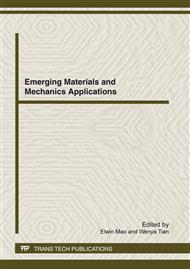p.553
p.558
p.562
p.568
p.571
p.576
p.582
p.588
p.593
Adaptive Acceleration Autopilot Design for Terminal Guidance of a Spinning Rocket Projectile
Abstract:
With extending range of modern unguided rocket projectiles, the dispersion is also becoming larger. An acceleration autopilot during terminal guidance is able to reduce the dispersion, improve the accuracy and comprehensive performance of a spinning rocket projectile. However, an autopilot designed at a given point can not reach good performance because the aerodynamic forces\moments and Mach number vary greatly during the terminal guidance. Via gain scheduling, an adaptive acceleration autopilot of the spinning rocket projectile is designed with considering the coupling of the servo system. The numerical simulations show that this acceleration autopilot is effective and adaptable.
Info:
Periodical:
Pages:
571-575
DOI:
Citation:
Online since:
March 2012
Authors:
Price:
Сopyright:
© 2012 Trans Tech Publications Ltd. All Rights Reserved
Share:
Citation:


